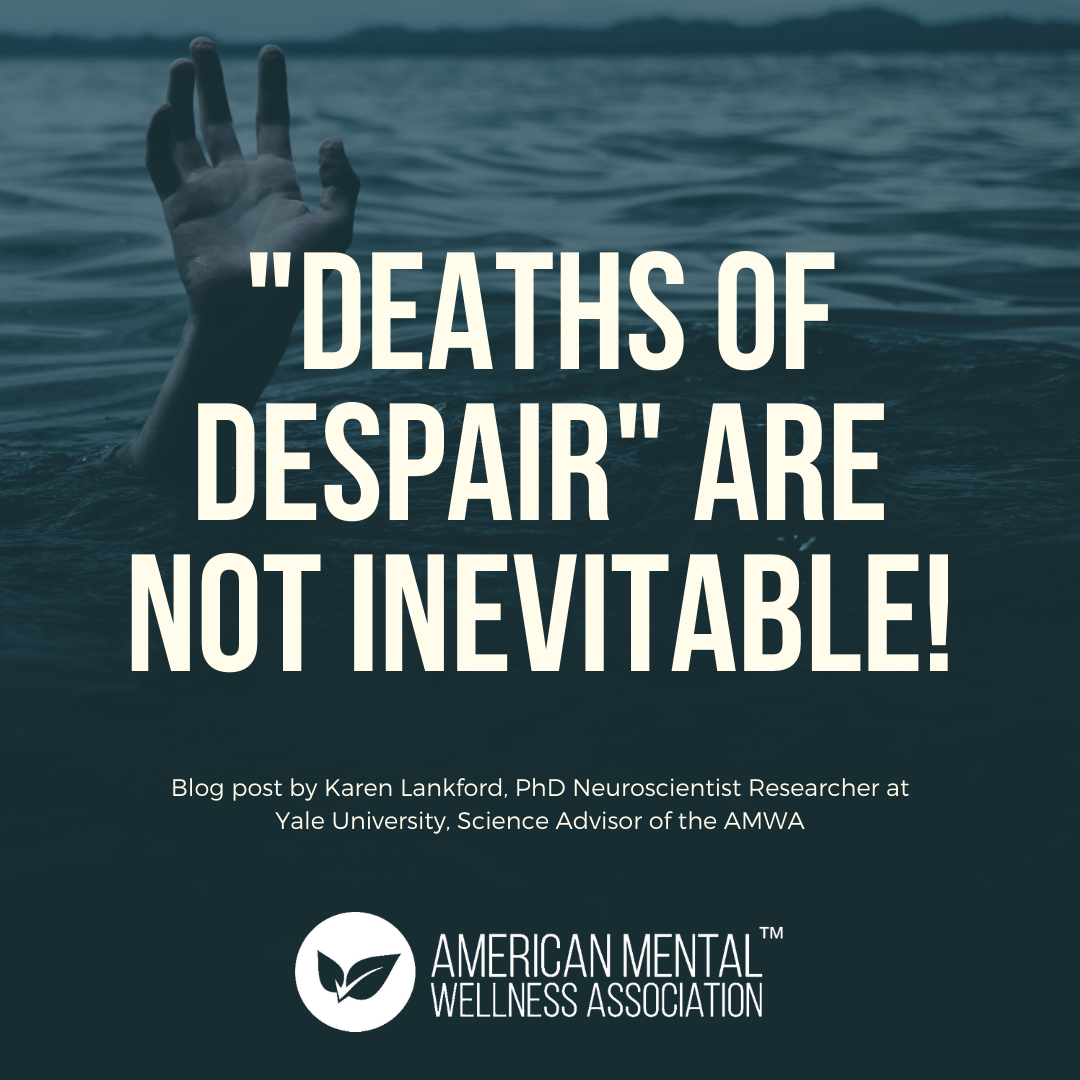“Deaths of Despair” Are NOT Inevitable! | Karen Lankford, PhD Neuroscientist Researcher
There is an argument being made by some for “reopening the economy” regardless, of the number of Americans who may die from COVID-19 if social distancing measures are relaxed before the spread of the disease can be contained by testing and quarantining the infected. The argument goes something like this: Job losses and social isolation cause emotional stress that will lead to increased rates of suicide and alcohol and drug abuse. The “Deaths of Despair” caused by closing down the economy will likely be greater than any death toll caused by the virus, and therefore it is more important to focus on saving the economy than directly saving lives from the disease.
One could question the mathematics behind these pronouncements, as we have already lost almost twice as many Americans to COVID-19 in a little more than two months than we lose to suicide in a full year, and the myopic sociological/economic reasoning, since much of the stress caused by job losses could be relieved by increasing unemployment insurance payments, expanding access to free health care, and creating new job opportunities. Yet the deeper and more dangerous flaw in their argument is the assumption that increased emotional stress must inevitably lead to increased substance abuse, addictions, and/or suicide. “Deaths of Despair” are manifestly NOT unavoidable byproducts of stress.
Increased stress will increase the incidence of clinical depression and anxiety disorders in those who are genetically susceptible to stress-induced anxiety and/or depression. That is the biological reality, every bit as much as the fact that COVID-19 infections will increase the risk of pneumonia and other life-threatening complications in susceptible individuals. However, experiencing clinical depression or anxiety does not mean someone must or will turn to alcohol and/or drug abuse, or suicide.
There is a very obvious alternative to such negative outcomes. Just treat the depression and/or anxiety properly.
Unlike COVID-19, clinical depression and anxiety disorders are quite treatable. This has not always been the case. Just as an HIV infection was once a death sentence, but can now be suppressed with daily medication, severe clinical depression and anxiety are no longer hopeless diagnoses. It may take a little trial and error to find the right medication, transcranial magnetic stimulation, and/or cognitive therapy for any individual, but most people suffering from anxiety and/or depression do get better, and often quite quickly after treatment. This is especially true if the condition is treated early.
A friend of mine was going through a very tough patch last year and found herself increasingly feeling overwhelmed, having difficulty concentrating and remembering things, and feeling emotionally numb much of the time. As soon as she recognized that what she was experiencing were classic signs of clinical depression, and, knowing that members of her family were prone to stress-induced bouts of clinical depression and anxiety, she decided to treat this as the medical problem it was. Flouting family tradition, she decided not to drink herself into a stupor for five years before seeking professional help, and instead made an appointment with her medical doctor right away. The first prescription she was given produced no discernible effect, and at the ten day follow up, she told the psychiatrist that she was having trouble even remembering to take her medication or do the recommended stress-relieving breathing exercises. He increased her dosage slightly and within 4 days after beginning the new dosing regimen, her mind snapped back into focus and she started feeling like herself again. She did the smart thing and treated the medical problem well before it reached a life-threatening stage. She worked with her physician to determine the proper medication and dosage and got her life back on track quickly. Not every person experiencing depression is fortunate enough to respond well to the first medication they try, but most people do get better with treatment.
I will leave the political decisions to the politicians and the economic calculations to the economists, but as a neuroscientist I resolutely insist that feelings of despair do not need to equal death.
Karen Lankford, PhD.
Neuroscientist Researcher
Yale University
and
Science Advisor for the American Mental Wellness Association


1 Comment:
Great message of hope Karen; reminds me of the great take-away from our wonderful 2019 AMWA National Conference – “Prevention and Early Intervention!”
May 21st, 2020